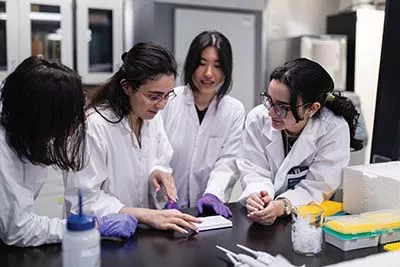
Our staff raised one theme repeatedly in reviewing this Framework’s first draft: UTM has tremendous capacity for collaboration that transforms the way we work. This capacity already enriches our success in teaching and research, student engagement, and community partnership. And it can do even more to promote a safe, healthy, inclusive environment for all our people. Like our tri-campus collaborators, UTM recognizes that systemic inequities demand system-wide action. So, we ground our work in a partnership approach to problem solving, asking questions that turn individuals into community.

- What can I do to help?
- From whom can I learn?
- With whom can I share and work to make things better?
These questions have special resonance as UTM works with tri-campus colleagues to implement commitments of U of T’s Anti-Black Racism Task Force, Anti-Semitism and Islamophobia Working Groups, and Task Force on Student Mental Health. This moment demands new connections between teams with diverse expertise and between complementary kinds of work: programs in personalized counselling that connect with services in campus safety; trauma-informed pedagogies that benefit from listening forums in our EDI office; funding for anti-racist research from advancement campaigns that celebrate our campus’s diversity. To operate sustainably, justly, and equitably, all of us—from student leaders and food services and procurement specialists to governance committees and grounds and custodial staff—need to feel empowered to work together.
UTM builds this culture of collaboration through a people-first strategy that designs equitable employment plans; nurtures our employees’ development; and leads positive change in working environments. That means we hold each other accountable, both in realizing our personal responsibilities and in making UTM a better community, one that welcomes equity-deserving groups, lifts barriers to belonging, and fosters everyone’s wellbeing.
Commitments
- Connect diverse teams to share diverse expertise across UTM and U of T.
- Enact anti-racism and anti-oppression work as collective responsibilities and shared actions.
- Align approaches to campus safety, accessibility, and physical, mental, and social health.
Accountabilities
- Have we created supports and structures that promote collaboration as our default mode of operations, including collaborations with donors, alumni, and tri-campus and external partners?
- Have we implemented positive change in the policies and processes that affect people who work, learn, and connect at UTM?
- Have we fulfilled the commitments to anti-discrimination—for staff, faculty, librarians, and students—expressed by U of T Working Groups and leadership?
- Have we taken a wide range of opportunities to advance justice and enhance belonging across our campus and beyond?
- Have we embedded wellbeing as a focus in all aspects of campus life, guided by better practices for the promotion of health, connection, and resilience?
